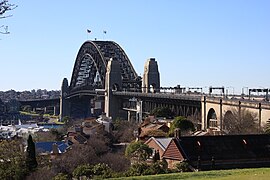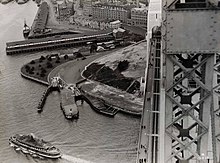| Dawes Point Sydney, New South Wales | |||||||||||||||
|---|---|---|---|---|---|---|---|---|---|---|---|---|---|---|---|
 Sydney Harbour Bridge, viewed from Observatory Hill Sydney Harbour Bridge, viewed from Observatory Hill | |||||||||||||||
 | |||||||||||||||
| Coordinates | 33°51′22″S 151°12′25″E / 33.856°S 151.207°E / -33.856; 151.207 | ||||||||||||||
| Population | 385 (SAL 2021) | ||||||||||||||
| Postcode(s) | 2000 | ||||||||||||||
| Area | 0.1 km (0.0 sq mi) | ||||||||||||||
| Location | 1 km (1 mi) north of Sydney CBD | ||||||||||||||
| LGA(s) | City of Sydney | ||||||||||||||
| Parish | St. Philip | ||||||||||||||
| State electorate(s) | Sydney | ||||||||||||||
| Federal division(s) | Sydney | ||||||||||||||
| |||||||||||||||
Dawes Point is a suburb of the City of Sydney, in the state of New South Wales, Australia. Dawes Point is located on the north-western edge of the Sydney central business district, at the southern end of Sydney Harbour Bridge, adjacent to The Rocks. Historically, Dawes Point (including Walsh Bay) has been considered to be part of the suburb of Millers Point and the name change is controversial (https://dictionaryofsydney.org/entry/millers_point).
History
The suburb of Dawes Point is on Gadigal Country. The point was originally known by the Aboriginal names of Tar-ra and Tullagalla. This was later changed by Governor Hunter at William Dawes' request to Point Maskelyne in honour of his patron Reverend Dr Nevil Maskelyne, British Astronomer Royal. He sent out the first astronomical instruments which were established at the point in the country's first observatory, by Lieutenant William Dawes (1762–1836), astronomer with the First Fleet. The point was renamed in honour of Dawes. Dawes Point is one of the places around Sydney Harbour that has been officially gazetted as a dual named site by the NSW Geographical Names Board. It was officially gazetted Dawes Point / Tar-Ra in 2002.
It was also the site of the first guns mounted in Sydney by Dawes in 1788, contained Sydney's first cemetery and later Dawes Point Battery. Walsh Bay was the site of Sydney's port facilities. The wharves were converted to apartments, theatres, restaurants, cafes and a hotel.

By the 1840s, the people of Dawes Point and Millers Point were a maritime community in which rich and poor mixed more than elsewhere in Sydney. Wharf owners and traders lived and worked beside those who worked on the wharves and bond stores, as well as those who arrived and left on ships. Only two of the merchant houses, built by and for the early wharf owners, survive. One is Walker's 50-foot wide villa built around 1825 and now part of Milton Terrace at 7-9 Lower Fort Street; the other is the home and offices of Edwards and Hunter, built in 1833 above their wharves which is where the Wharf Theatre now stands.
Mostly prosperous in its early years, the area was less desirable by the 1890s. At the beginning of the 20th century, the government compulsorily acquired all private wharves, homes and commercial properties in the Rocks, Dawes Point and Millers Point. Modern and efficient wharves with dual level access were built, as well as new accommodation for workers, such as the Workers Flats of Lower Fort Street designed by Government Architect Vernon. During 2014–18, the majority of the area's social housing was sold and its tenants left the Millers Point area.
Heritage listings
Dawes Point has a number of heritage-listed sites, including:
- 37 Lower Fort Street: Dawesleigh
- Bradfield Highway and North Shore railway: Sydney Harbour Bridge
- 8–12 Trinity Avenue: Darling House c. 1833–1842
- 1–19 Lower Fort Street: Milton Terrace
- 21–23 Lower Fort Street, Millers Point: Nicholson's Cottages
- 25–33 Lower Fort Street: Linsley Terrace
- 35 Lower Fort Street: Major House
- 39–41 Lower Fort Street: John Verge Townhouses
- 43 Lower Fort Street: Bligh House (Clydebank)
- 47–53 Lower Fort Street: Palermo Terrace
- 57–61 Lower Fort Street: Flavelle Terrace
- 63–65 Lower Fort Street
- 69–73 Lower Fort Street
- 75–77 Lower Fort Street
- 79 Lower Fort Street
- 81 Lower Fort Street, The Hero of Waterloo Hotel
Population
At the 2021 census, the population of Dawes Point had increased to 385. 56.9% of people were born in Australia and 76.4% of people only spoke English at home. The most common response for religion was No Religion at 45.7%. Median mortgage payments were $3,467 a month.
In the 2016 census, there were 357 people in Dawes Point. 63.8% of people were born in Australia and 76.2% of people only spoke English at home. The most common response for religion was No Religion at 39.9%.
Median mortgage repayments were $5,200 a month or $62,400 a year, the highest median mortgage repayment in the greater Sydney area.
Culture
The Sydney Theatre and The Wharf Theatre, which are part of the Sydney Theatre Company, are located in Dawes Point.
Gallery
-
 The Sydney Theatre and The Wharf Theatre, which are part of the Sydney Theatre Company, are located in Dawes Point
The Sydney Theatre and The Wharf Theatre, which are part of the Sydney Theatre Company, are located in Dawes Point
-
Pier One on Walsh Bay
-
Walsh Bay ferry wharf
-
 Southern approach of the Sydney Harbour Bridge with Dawes Point to the right.
Southern approach of the Sydney Harbour Bridge with Dawes Point to the right.
-
 Terraces, Pottinger Street (c. 2007)
Terraces, Pottinger Street (c. 2007)
-
 Terraces, Pottinger Street (c. 2007)
Terraces, Pottinger Street (c. 2007)
-
 The Sydney Opera House seen from Dawes Point
The Sydney Opera House seen from Dawes Point
-
 Aerial view of Dawes point in the 1930s
Aerial view of Dawes point in the 1930s
References
- Australian Bureau of Statistics (28 June 2022). "Dawes Point (suburb and locality)". Australian Census 2021 QuickStats. Retrieved 28 June 2022.

- Mander-Jones, Phyllis (1966). "Dawes, William (1762–1836)". Australian Dictionary of Biography. Archived from the original on 22 October 2012. Retrieved 10 July 2021.
- The Book of Sydney Suburbs, Compiled by Frances Pollon, Angus & Robertson Publishers, 1990, Published in Australia ISBN 0-207-14495-8, page 81
- "Tar-Ra place name". NSW Geographical Names Board. Archived from the original on 10 July 2021. Retrieved 10 July 2021.
- "1840". MILLERS POINT. Archived from the original on 28 February 2016. Retrieved 2 January 2016.
- "37 & 35 Lower Fort Street". MILLERS POINT. Archived from the original on 2 March 2016. Retrieved 2 January 2016.
- "The Workers Flats of Millers Point". MILLERS POINT. Archived from the original on 9 March 2015. Retrieved 2 January 2016.
- "Dawesleigh". New South Wales State Heritage Register. Department of Planning & Environment. H00522. Retrieved 18 May 2018.
 Text is licensed by State of New South Wales (Department of Planning and Environment) under CC BY 4.0 licence.
Text is licensed by State of New South Wales (Department of Planning and Environment) under CC BY 4.0 licence.
- "Sydney Harbour Bridge, approaches and viaducts (road and rail)". New South Wales State Heritage Register. Department of Planning & Environment. H00781. Retrieved 18 May 2018.
 Text is licensed by State of New South Wales (Department of Planning and Environment) under CC BY 4.0 licence.
Text is licensed by State of New South Wales (Department of Planning and Environment) under CC BY 4.0 licence.
- Casey and Lowe Associates (1994). Excavation Report, Darling House, Millers Point. NSW Department of Housing.
- "History | The Hero of Waterloo - The Rocks, Sydney, Australia. Established 1843. Live music, award winning food, ghost tours and a heritage landmark classification it is a must when visiting The Rocks, the birthplace of the nation, to include a visit and soak up the atmosphere at this convict-built hotel". Retrieved 10 March 2019.
- ^ "2021 Dawes Point, Census All persons QuickStats". Australian Bureau of Statistics. Retrieved 19 August 2022.
- ^ Australian Bureau of Statistics (27 June 2017). "Dawes Point (State Suburb)". 2016 Census QuickStats. Retrieved 2 July 2017.

- "Sydney's biggest mortgage bills: how your suburb compares". 17 August 2017.
External links
![]() Media related to Dawes Point, New South Wales at Wikimedia Commons
Media related to Dawes Point, New South Wales at Wikimedia Commons
- Fitzgerald, Shirley (2008). "Dawes Point". Dictionary of Sydney. Retrieved 26 September 2015. [CC:Suburbs of Sydney